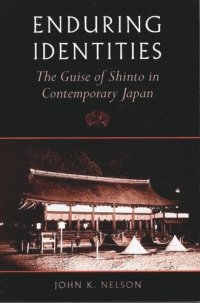
Ebook: Enduring Identities: The Guise of Shinto in Contemporary Japan
Author: John K. Nelson
- Year: 2000
- Publisher: University of Hawaii Press
- Language: English
- pdf
Enduring Identities is an attempt to understand the continuing relevance of Shinto to the cultural identity of contemporary Japanese. The enduring significance of this ancient yet innovative religion is evidenced each year by the millions of Japanese who visit its shrines. They might come merely seeking a park-like setting or to make a request of the shrine's deities, asking for a marriage partner, a baby, or success at school or work; or they might come to give thanks for benefits received through the intercession of deities or to legitimate and sacralize civic and political activities.
Through an investigation of one of Japan's most important and venerated Shinto shrines, Kamo Wake Ikazuchi Jinja (more commonly Kamigamo Jinja), the book addresses what appears through Western and some Asian eyes to be an exotic and incongruous blend of superstition and reason as well as a photogenic juxtaposition of present and past. Combining theoretical sophistication with extensive fieldwork and a deep knowledge of Japan, John Nelson documents and interprets the ancient Kyoto shrine's yearly cycle of rituals and festivals, its sanctified landscapes, and the people who make it viable.
At local and regional levels, Kamigamo Shrine's ritual traditions (such as the famous Hollyhock Festival) and the strategies for their perpetuation and implementation provide points of departure for issues that anthropologists, historians, and scholars of religion will recognize as central to their disciplines. These include the formation of social memory, the role of individual agency within institutional politics, religious practice and performance, the shaping of sacred space and place, ethnic versus cultural identity, and the politics of historical representation and cultural nationalism. Nelson links these themes through a detailed ethnography about a significant place and institution, which until now has been largely closed to both Japanese and foreign scholars.
In contrast to conventional notions of ideology and institutions, he shows how a religious tradition's lack of centralized dogma, charismatic leaders, and sacred texts promotes rather than hinders a broad-based public participation with a variety of institutional agendas, most of which have very little to do with belief. He concludes that it is this structural flexibility, coupled with ample economic, human, and cultural resources, that nurtures a reworking of multiple identities--all of which resonate with the past, fully engage the present, and, with care, will endure well into the future.